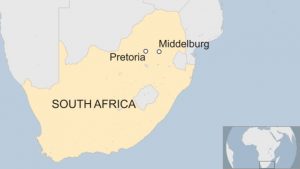England have been drawn against Croatia and the Czech Republic at UEFA EURO 2020, with Wales alongside Italy, Switzerland and Turkey in Group A.
Germany will face world champions France and reigning European champions Portugal in Group F.
The winners of Scotland’s play-off path, which includes Norway, Serbia and Israel, will join England in Group D.
Gareth Southgate’s World Cup semi-finalists will begin their campaign against Croatia at Wembley on 14 June.
The tournament’s opening game will see Italy host Turkey in Rome on 12 June.
Scotland, Northern Ireland and the Republic of Ireland all feature in the play-offs next March, where 16 teams will compete to fill the final four places.
The tournament, which will take place in 12 cities across Europe, will be hosted across the continent for the first time to mark the 60th anniversary of the competition.
Group A: Italy, Switzerland, Turkey, Wales
Group B: Belgium, Russia, Denmark, Finland
Group C: Ukraine, Netherlands, Austria, Path D/A*
Group D: England, Croatia, Czech Republic, Path C**
Group E: Spain, Poland, Sweden, Path B***
Group F: Germany, France, Portugal, Path A/D*
*Iceland, Romania, Bulgaria, Hungary / Georgia, North Macedonia, Kosovo, Belarus
**Scotland, Israel, Norway, Serbia
***Slovakia, Bosnia-Herzegovina, Northern Ireland, Republic of Ireland
Euro 2020: Full groups and schedule
Everything you need to know about Euro 2020
‘Favourable draw but black cloud on horizon for England’
Giggs says Wales ‘are a match for anyone’
Where and when do England play?
England, joint bookmakers’ favourites along with France to win the tournament, will benefit from hosting all three of their group games at Wembley.
Southgate’s side already knew they would be placed in Group D, with the qualified countries of the 12 host cities purposefully placed in specific groups to ensure at least two home games.
England’s tournament begins against Croatia in a repeat of the 2018 World Cup semi-final, which was won by Zlatko Dalic’s side.
Sunday 14 June: England v Croatia (Wembley)
Friday 19 June: England v Path C play-off winners (Wembley)
Tuesday 23 June: Czech Republic v England (Wembley)
If England win their group, their last-16 tie would be in Dublin against the runner-ups in a hugely competitive looking Group F – which already includes Germany, France and Portugal – with a potential quarter-final in Rome.
Should they finish second, it would be a trip to Copenhagen against the runner-ups from Group E, which features Spain, before a quarter-final in St Petersburg. There are other possibilities if they are one of the best third-place finishers.
Reacting to the draw, England manager Southgate said: “I’m never sure whether it’s a good draw. We have played two of the teams before and for us to play at Wembley is something special. We are looking forward to the tournament.
“We have to accept that expectations have changed from where we were. We are very critical of ourselves. We would rather be a team that are fancied than a team with no chance.”
Where and when will Wales play?
Wales, semi-finalists in 2016, land in Group A alongside 1968 winners Italy, who won all 10 of their qualification matches and conceded just four goals.
They are joined by Switzerland, winners of their qualification group, and a Turkey side that earned a win and a draw against world champions France.
Italy will play their three group games at Rome’s Stadio Olimpico, with the other venue in the group being Baku’s Olympic Stadium.
Guaranteed to face at least one trip to Azerbaijan or Russia prior to the draw, Wales boss Ryan Giggs will be pleased with his side’s travel plans which sees them play twice in Baku before a final group match in the Italian capital.
Saturday 13 June: Wales v Switzerland (Baku)
Wednesday 17 June: Turkey v Wales (Baku)
Sunday 21 June: Italy v Wales (Rome)
On his side’s draw, Giggs said: “Logistically looking at it, it’s Baku, Baku, Rome, rather than having Rome in the middle – so for the fans it’s much better. Switzerland are a good team, talented. Turkey were in a group with France and Iceland so have done well to come through that. And Italy have won every game so that will be tough.
“I’ll get around and watch the players as much as I can. You hope that come June you have a group of healthy players to choose from and if we have that, we’re a match for anyone. We want to take our chance, just like in 2016.”
Pick your starting line-ups for Wales and England
The ‘Group of F’ and familiar foes – the draw on social media
What do Scotland and Northern Ireland need to do?
Triumph in the Euro 2020 play-offs in March, and Steve Clarke’s Scotland would end a 22-year wait for major tournament football.

That wait would come to an end against the Czech Republic in Glasgow on 15 June, with a trip to face England at Wembley following on Friday 19 June and a final group game at Hampden Park against Croatia four days later.
But first, Clarke’s side must find a way past Israel at home on 26 March.
Succeed, and they will then face an away tie against the winner of Norway’s play-off semi-final with Serbia five days later to battle for qualification.
Meanwhile, Northern Ireland are away to Bosnia-Herzegovina in their play-off semi-final, with the winner at home to the Republic of Ireland or Slovakia in the Path B final.
Saturday’s draw means Spain, Sweden and Poland would await Northern Ireland or the Republic of Ireland in Group E should they qualify.
However, with the play-off winners not being decided until 31 March, there remains a bit of a wait yet for the final groups to be confirmed.
The most difficult group ever?
World champions France, European champions Portugal and the previous World Cup winners Germany are all together with one play-off team in Group F.
This is only the second major tournament where the world champions and the European champions will have met in the group stage – after Euro 1992, when the Netherlands beat Germany.
Germany, who won the 2014 World Cup, will host their three group games in Munich, with the other matches in Budapest. If Hungary win their play-offs, they will be in the group, hosting two games.
One big boost for the trio is that four of the tournament’s six third-placed teams go into the last 16.
“This is a group of death,” said Germany boss Joachim Low.
“The games in Munich will be football festivals. The expectations will be quite high. For our young team, this will be a huge challenge but also a big motivation. This is the reward for winning the qualifier group.”
Would England be better finishing second?
In a similar vein to the 2018 World Cup, England may well be better off finishing second in their group.
The winners of England’s Group D will face the runners-up in Group F – probably Germany, France or Portugal – in Dublin.
But if England finish as runners-up, they would face the team who finish second in the group containing Spain, Poland, Sweden and possibly Northern Ireland or the Republic in Copenhagen.
However, the quarter-finalists either way are likely to be difficult – possibly Spain in St Petersburg if they win their group, or the winners of the “group of death” in Russia if they finish second.
“If you can win and be top seeds then you have to take control of your destiny,” England boss Gareth Southgate told BBC Sport. “Let’s hope we have the decision to make. We will take on whoever comes. Everyone will be thinking the same about playing us.”
Source: BBC







